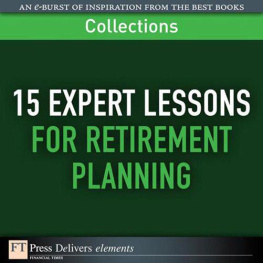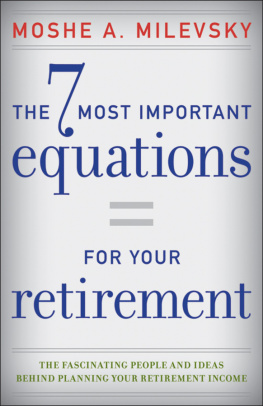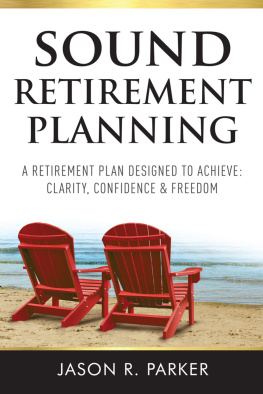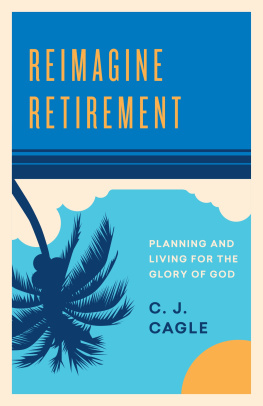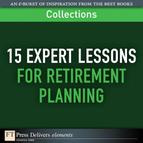Moshe A. Milevsky - 15 Expert Lessons for Retirement Planning
Here you can read online Moshe A. Milevsky - 15 Expert Lessons for Retirement Planning full text of the book (entire story) in english for free. Download pdf and epub, get meaning, cover and reviews about this ebook. year: 2010, publisher: FT Press, genre: Home and family. Description of the work, (preface) as well as reviews are available. Best literature library LitArk.com created for fans of good reading and offers a wide selection of genres:
Romance novel
Science fiction
Adventure
Detective
Science
History
Home and family
Prose
Art
Politics
Computer
Non-fiction
Religion
Business
Children
Humor
Choose a favorite category and find really read worthwhile books. Enjoy immersion in the world of imagination, feel the emotions of the characters or learn something new for yourself, make an fascinating discovery.
- Book:15 Expert Lessons for Retirement Planning
- Author:
- Publisher:FT Press
- Genre:
- Year:2010
- Rating:4 / 5
- Favourites:Add to favourites
- Your mark:
- 80
- 1
- 2
- 3
- 4
- 5
15 Expert Lessons for Retirement Planning: summary, description and annotation
We offer to read an annotation, description, summary or preface (depends on what the author of the book "15 Expert Lessons for Retirement Planning" wrote himself). If you haven't found the necessary information about the book — write in the comments, we will try to find it.
15 Expert Lessons for Retirement Planning — read online for free the complete book (whole text) full work
Below is the text of the book, divided by pages. System saving the place of the last page read, allows you to conveniently read the book "15 Expert Lessons for Retirement Planning" online for free, without having to search again every time where you left off. Put a bookmark, and you can go to the page where you finished reading at any time.
Font size:
Interval:
Bookmark:

Moshe A. Milevsky
Trent A. Hamm
Liz Pulliam Weston
Bonnie Kirchner
Jane White
Frank Armstrong
Paul Brown
James Walker
Linda H. Lewis
Steve Weisman
Moshe A. Milevsky, Ph.D.
Professor Richard Thaler from the University of Chicago and Professor Shlomo Benartzi from UCLA have devoted a substantial part of their careers to studying the financial mistakes and monetary blunders that people make in their daily lives. Apparently even smart people are not immune. These two researchers are leaders in the nascent field of behavioral finance, which argues that consumers are not cold, calculating machines that optimize their decisions in a rigorous mathematical fashion, but instead they adopt simple general rules for financial decision making, which often leads them far astray.
One of the most egregious behavioral sins these two researchers have identified is the tendency of too many Americans to allocate too much of their 401(k) planand even their own investmentsto company stock. Apparently, more than five million Americans have over 60% of their retirement savings invested in their own company stock. Note that this is well after the notorious cases of Enron or WorldCom, where employees discovered the ruinous risks of such a myopic strategy. Even more surprising, ongoing surveys and focus groups conducted with these same employees indicate that they simply do not view this behavior as problematic. They think it is normal and healthy to invest in things they know because they can keep an eye on their investments. This optimism stands in contrast to the fact there is absolutely no evidence that employees have any superior ability to outguess the market or the experts regarding the performance of the stocks they hold and the companies they work for.
Many of the five million Americans who are engaging in this risky practice might be dead wrong. They are improperly investing their human capital and financial capital in the same economic basket, and their retirement might be at risk. Indeed, the evidence suggests that we have a long way to go before individuals truly consider the risk and return characteristics of their human capital and invest their financial capital in a way that balances their comprehensive risks. Hopefully, this book will help along this path. Remember, your 401(k) is a number, not a pension. It is up to you to manage and grow your nest egg so that it can eventually be converted and allocated into a pension.
At the university where I am a faculty member, I teach a popular 12-week course on personal financial planning to third- and fourth-year undergraduate students. During the semester, I try to cover the entire life cycle of financial issues, from cradle to grave. In the first few weeks, I spend quite a bit of class time on basic topics such as financial budgeting, managing credit card debt, coping with student loans, and so on. I usually get pretty full attendance and engaged interest during these early lectures. In fact, sometimes I get even more than full attendance from non-registered, yet interested students, who want to learn whether leasing is in fact better than buying a car, or whether ETFs are better or worse than index funds for the cost-conscious do-it-yourself investor. They are surprised when I preach that debt can be good. They absolutely resonate with my message that human capital is valuable and should be treated as an asset class to be hedged and insured. In fact, even the topic of life insurance appears interesting to them, perhaps due to some morbid curiosity.
Then, somewhere towards the latter part of the semester, as things are winding down around week number eight or nine, I get to the topic of pensions and retirement income planning. Here I tell them about pension annuities, as well as some of the demographic trends in aging. And, as much as it pains me to admit this, the attendance isnt great for that lecture. Im lucky if I get 60% of my enrolled students, and many of those who do bother to show up spend much of the time text-messaging, pod-casting, and whatever else they can do to pass the time. The following week, which is devoted to estate planning, is even worse. In factand Im only half joking hereif you have some extra altruistic energy on your hands and want to take on a challenge, try spending time with a bunch of teenagers explaining the minutia of calculating Social Security payments early on a Monday morning, no less.
And to be honest, I cant say I blame them. These kids are just not interested in retirement income planning. It is 40 years ahead of its time for them. To many of them that might as well be infinity. They are concerned with finding their dream job, getting rid of their student loan debt, and hopefully accumulating some savings. Even the topic of buying a home is distant to them. The pension is outside their realm of experience.
Yet, when I have the occasional chance to interact with students parents and grandparents, the situation is very different. When I mention that I also teach and do research on pensions and retirement income planning, I feel like the only doctor at an evening cocktail party. Everyone wants free advice.
In fact, the personal interest in pension matters extends to my academic colleagues at the University. Around the age of retirement all members of our pension plan must decide whether to take a lump-sum settlement and invest and manage it themselves, or whether to keep the money in the plan and instead receive a monthly income. Many of these professors have heard that I might know something about this issue and I get a steady stream of biology, chemistry, and engineering professors visiting my office for a consultation around the time of their big decision. They are wondering whether they should take the money and run, hoping to get a better deal themselves. (Interestingly, I dont get many humanities professors. Im not sure why.)
But yet, the topic of pensions is more than just a matter of demographic interest. When I pose the question to my undergraduate studentswhich retirement arrangement would you rather have, defined benefit (DB) or defined contribution (DC)?most of them select the DC plan. Some of them justify their decision with some fairly persuasive arguments. They point out that they will likely be working for a number of different employers over the course of their life. Some of them will be spending time in different countries, or at least industries. Few, if any, believe (or even dream) they will be working for one company over the course of 30 years. They therefore need retirement savings with mobility and flexibility. Alas, a defined benefit plan with its rigid formulas based on years of service and final salary would make little sense to them. It is a relic from an industrial past. Indeed, this is likely why so many employees are content with 401(k) and IRA plans. The employers only responsibility is to contribute 5% to 10% of their annual salary cost to this piggy bank, and the employee is responsible for everything else. They take the risk and get the reward.
The statistics confirm this way of thinking. Many of the companies freezing or converting their defined benefit (DB) pensions and replacing them with defined contribution (DC) plans are doing so partly as a result of the demand from employees.
And yet, as the trends in aging continue to develop themselves out over time, the topic of pension and retirement income will only grow in importance. Remember that retirees face a number of unique financial risks that are not (as) relevant earlier on in life. Retirees face longevity risk, which is the uncertainty of their life horizon and its costs. Retirees face unique inflation risk. Finally, they have to deal with a particular type of financial market risk, which has been dubbed the term
Next pageFont size:
Interval:
Bookmark:
Similar books «15 Expert Lessons for Retirement Planning»
Look at similar books to 15 Expert Lessons for Retirement Planning. We have selected literature similar in name and meaning in the hope of providing readers with more options to find new, interesting, not yet read works.
Discussion, reviews of the book 15 Expert Lessons for Retirement Planning and just readers' own opinions. Leave your comments, write what you think about the work, its meaning or the main characters. Specify what exactly you liked and what you didn't like, and why you think so.

